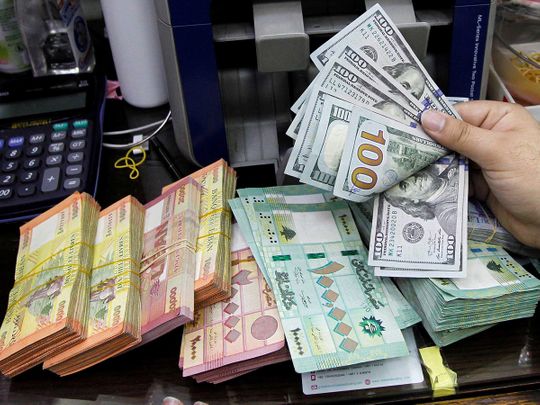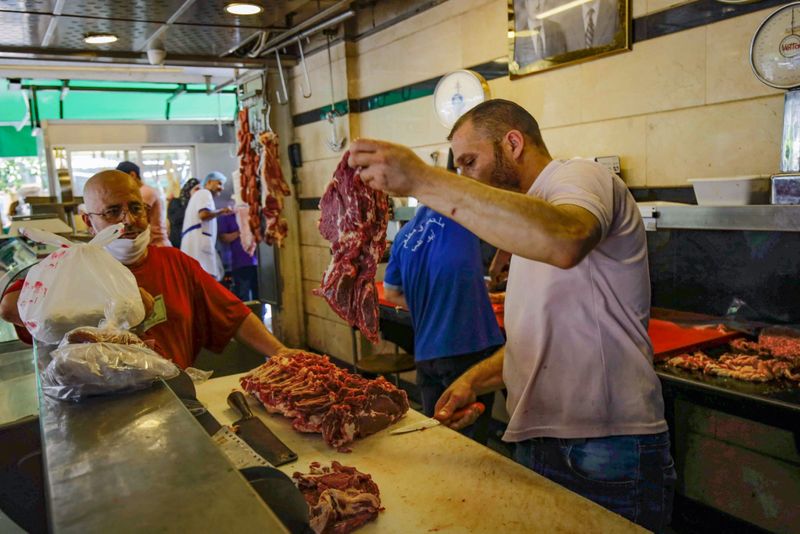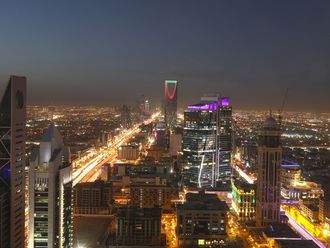
Dubai: Lebanon’s current economic catastrophe is epitomised by one factor more than any other: The free fall of its currency. Since 1997, the Lebanese Central Bank has artificially pegged to the lira was to the US dollar at the rate of $1 = 1,500LP (1,507 to be precise).
The Central Bank managed this feat by borrowing from private banks, who instead depended on depositors attracted by its huge interest rates (up to 14 per cent). Despite its multiple socio-political, economic and security challenges, the Lebanese economy managed to strut along primarily due to the stability provided to its financial system by the dollar peg.
Last year this time, if you wanted to buy something in Lebanon that was worth $2, you could pay $2 or 3,000 LP - or you could pay $1 and 1,500LP. It was interchangeable.
Corrupt oligarchs
But since September, the lira has lost 85 to 90 per cent of its value - to the extent that the exchange rate on the streets is 9,500 to 10,000 lira to the dollar. The government rate remains the same ($1=1,507) but almost no one has access to that rate, except for the corrupt oligarchs and politicians who are the cause of most of Lebanon’s ills.

There used to be a middle class in Lebanon, but now the rich are rich, the middle class has become poor and the poor have become destitute
The situation was best described by Antoine El Hajj, a star Lebanese chef, who said in an interview to the media: “There used to be a middle class in Lebanon, but now the rich are rich, the middle class has become poor and the poor have become destitute.”
Meat at $42 a kilo
What does this mean? Say you salary was $500 a month. You could expect to be paid 750,000LP or $500 and it would be the same. But now, you are paid 750,000LP, and that is the equivalent of $75. In other words, you cannot buy goods or services worth $500 with 750,000LP. For instance, thanks to the collapse in currency, red meat, which was about $9 a kilogramme before the collapse, is now more than $42 a kilo. Red meat has become such a luxury that even the army cannot afford it on its anymore and has struck it off the menu for soldiers.

Dearth of dollars
Those who saved their money in lira in the banks have seen a lifetime’s savings simply wiped out. Even those who were smart enough to keep their savings in dollar accounts now cannot access their precious dollars. Simply because there aren’t enough dollars in the Lebanese financial system. Banks have imposed severe restrictions on how much you can withdraw from your own bank account; usually, it is about $200 a week. Even Lebanese expats who want to send money in dollars to family and friends in Lebanon cannot do so as the dollars are being confiscated by banks and money exchanges.
No credit cards, please
To add to the disastrous situation, small and large businesses are refusing to accept credit card transactions from customers, fearing that the banks will not honour the transactions.
The dearth of dollars has meant that Lebanon, a country that imports more than 80 per cent of its daily needs, can suddenly not afford to do so, leading to severe shortages in supermarkets.
Hyperinflation has set in, and the buying power has almost vanished.
Barter economy
As the financial crisis reaches the abyss, many Lebanese have resorted to the ancient barter system, especially on Facebook groups. Gym equipment is being exchanged for canned food; car spare parts for baby milk formula. There is every sign that Lebanon heading for a Zimbabwe or Venezuela-style collapse. And this comes at a time when it also has to deal with COVID-19.








